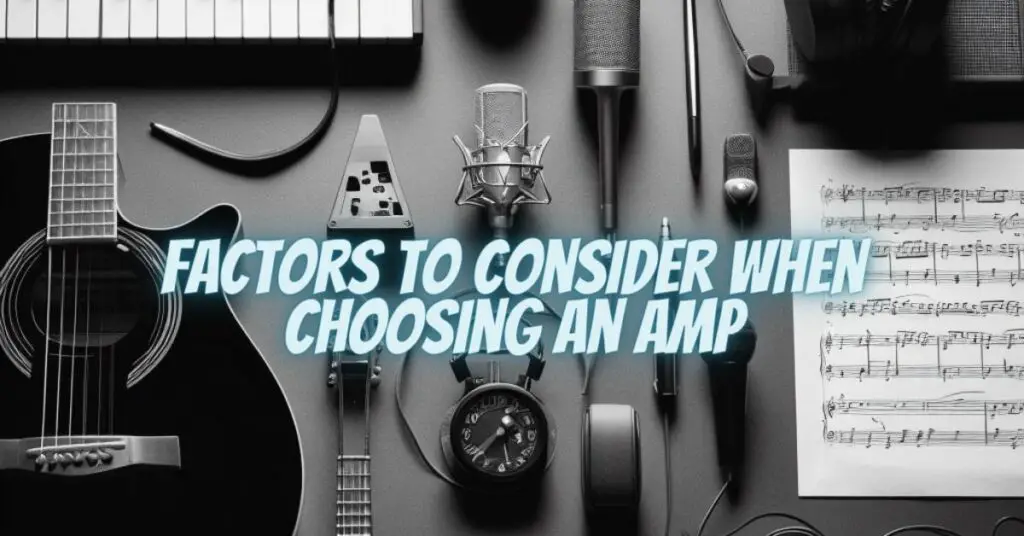Selecting the right amplifier is a pivotal decision for any musician. Whether you play electric guitar, bass, or any other instrument that requires amplification, finding the perfect amp is essential for shaping your sound. In this article, we’ll explore the key factors to consider when choosing an amplifier to match your musical preferences and needs.
- Amplifier Type
The first step in choosing an amp is deciding on the type that suits your instrument and style. The most common types are:
- Guitar Amps: Designed specifically for electric guitars, these amps come in various styles, including tube, solid-state, and modeling amps, each offering distinct tonal characteristics.
- Bass Amps: Tailored for bass guitars, these amps emphasize low-end frequencies and are available in various configurations, such as combos and amp heads paired with separate cabinets.
- Acoustic Amps: Built for acoustic instruments, these amps reproduce the natural tones of acoustic guitars, violins, and other acoustic instruments with clarity.
- Keyboard Amps: Designed to handle the wide frequency range of keyboards and synthesizers, keyboard amps provide clean and balanced sound.
- Amplifier Power (Wattage)
Amplifier power determines the volume and headroom of your amp. Smaller wattage amps (10-30 watts) are suitable for practice and small gigs, while higher wattage amps (50 watts and above) are ideal for larger venues. Consider your playing environment and volume requirements when choosing the wattage.
- Tonal Characteristics
Different amplifiers offer distinct tonal characteristics. Tube amps are known for their warmth and harmonic richness, while solid-state amps provide reliability and cleaner tones. Modeling amps can emulate various amp tones, making them highly versatile. Try out different types to discover which suits your sound preferences.
- Number of Channels
Amplifiers often come with multiple channels, which allow you to switch between different sounds and settings. A two-channel amp, for instance, might have a clean channel and a gain channel for overdriven tones. Consider the flexibility you need for your musical style.
- Effects and Onboard Features
Many modern amplifiers come with built-in effects like reverb, delay, and modulation. Having these effects onboard can be convenient, but if you prefer external effects pedals, you might want a simpler, no-frills amp.
- Size and Portability
Consider the size and weight of the amp, especially if you need to transport it frequently. Smaller, more compact amps are easier to carry, while larger ones may offer greater power and speaker size.
- Speaker Size
The size of the speaker(s) in your amp significantly influences your sound. Smaller speakers (8-10 inches) produce tight, focused tones, while larger ones (12-15 inches) provide fuller, deeper sound. Choose a speaker size that complements your style and venue.
- Budget
Set a budget range for your amplifier purchase. Amplifiers come in a wide price range, from budget-friendly options to high-end models. A well-informed budget helps you narrow down your options.
- Brand and Reputation
Research amplifier brands and models to gauge their reputation for quality and reliability. Reading reviews and seeking recommendations from fellow musicians can be valuable.
- Compatibility with Your Instruments
Ensure that your amplifier is compatible with the instruments you intend to use. For example, if you play both electric and acoustic guitar, look for an amp that accommodates both.
- Future-Proofing
Consider your long-term musical goals. If you anticipate playing larger gigs or expanding your gear collection, invest in an amp that can grow with you.
- Try Before You Buy
Before making a final decision, try out the amplifiers you’re interested in. Play your own instrument through them to evaluate how they sound and feel. Your personal experience will be the ultimate factor in your decision.
Selecting the right amplifier is a critical step in shaping your musical sound and ensuring that your instrument shines in any context. By considering factors such as amplifier type, power, tonal characteristics, features, size, budget, and compatibility, you can make an informed decision and choose an amp that perfectly matches your musical needs and preferences. Whether you’re a beginner or a seasoned musician, the right amplifier will be a faithful companion in your musical journey.


